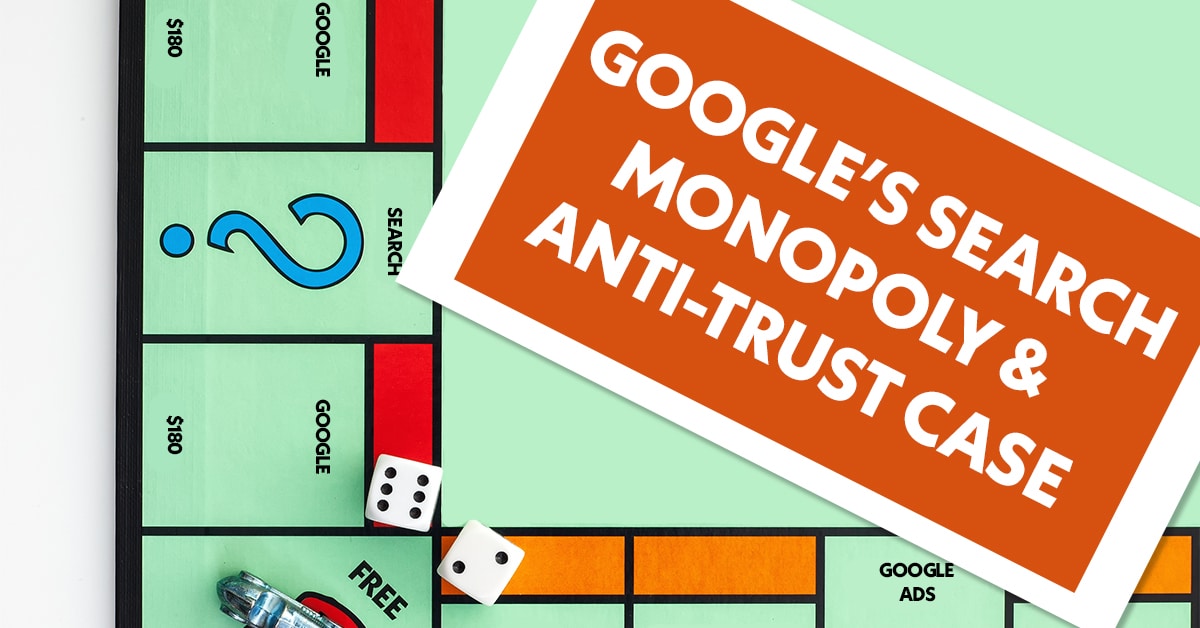
Since the launch of Google in 1998, its mission of organizing the world’s information and make it universally accessible and useful has worked as they have taken the world by storm and gained true dominance over the web as it worked to help users find information and sites online.
Google is thought to currently have over 90.46% of the search engine market share worldwide. Although Google does not share exact numbers, it is said Google process 3.8 million searches per minute across the globe. That is a grand total of 5.6 billion searches per day or 2 trillion searches per year. These are incredible numbers to comprehend. This incredible number of searches is far more than any other search engine, but is it possible that Google has violated US antitrust laws to gain its dominance? The research points to yes.
Google has discovered that it could leverage its ad tech, and as a business owner or consumer, we want you to be aware of this allegation. Throughout this article, we intend to explain how Google Ads has taken advantage of its search market and created a monopoly that is sure to affect you.
What is Search Marketing?
Search marketing is defined by wordstream.com as a tactic used to gain online presence and traffic via paid and unpaid strategies on search engines.
When you search for something, no matter the search engine platform, you are shown a list of options on a page known as a SERP or Search Engine Results Page. Millions of businesses compete for the chance to be on the first page when relevant keywords are typed into a search query because studies have proven that if you appear on the first page of Google you will receive 95% more web traffic than if your website is located on pages thereafter.
So, how does one get to the first Search Engine Results Page? There are 2 ways to get to the top of the SERPs. First is with organic search engine optimization, which takes time to compound your efforts and show increased rankings over a period of months to years, depending on your competition’s organic optimization. This involves a continuous marketing and content strategy that can be time-consuming with slower results. The quickest way to get to the top of the SERP’s is by taking advantage of Googles ad tech platform and paying Google for the traffic clicks or leads you receive, with each keyword ranking at a different monetary value, in an attempt to help you capture these results. In a nutshell, you are paying premium rates to Google to appear higher than your competition.
What does the term “Ad Tech” mean?
The term Ad Tech (short for Advertising technology) is an umbrella term for software tools that help digital ads target, deliver, and analyze all their advertising efforts. These advertising software platforms allow you to make the best use of your advertising budget – working to deliver the right content to the right customer base, at the right time.
Google Ads is one of many ad tech platforms, and like most how much you are going to spend is based on who, how, or what you are targeting. Demographics, keywords, and topics have monetary value tied to them. These values are calculated based on how many other business (a.k.a. your competition) are targeting the same things as you. When it comes to Google Text Ads you will be bidding on keywords that a user would type into Google to find your product or service. A series of paid advertisements generally appear on the SERP’s where they are placed there based on the amount they are paying for that click. Meaning those at the top of page one is paying a higher rate than those advertisements at the bottom of page one.
Google not only dominates the search platform market, they also control nearly 70% of the online ad tech market. Meaning, it is a safe assumption to say that Google rules the online advertising eco-system.
Is Google a Search Monopoly?
Is Google a Search Monopoly? We will let you decide.
First, let’s discuss what a monopoly, in fact, is. Oxford Languages defines a monopoly as the exclusive possession or control of the supply of or trade in a commodity or service.
Those who claim Google is a search monopoly came to this conclusion by focusing on the ad tech aspects of Google as a corporation. The foundation for this claim was initially created in 2010 after Google choose to publicly disclosed how much of the ad revenue they made was shared with publishers.
These monopoly accusations have been furthered as we have watched Google use its monetary success to acquire its competitors and become the number 1 player in the market for digital ads. Some say it is impossible to buy or sell products online without the use of Google and its products. Google’s piece of digital advertising is incredibly large, and because they have a history of buying out their competitors, their profit continues to grow. For example, in 2019, Google had $134.8 billion in profit-based revenue from digital advertising alone. The information that Google has released on organizations that they have acquired show that they now participate in every level of the Google Advertising stack, meaning that their profits will continue to skyrocket while continuing to weaken other search engines.
Google Grilled on Capitol Hill
On July 29, 2020. Google was grilled on Capitol Hill over its market power alongside Amazon, Apple, and Facebook. The session was attended virtually but allowed for both Democrats and Republicans alike to confront the executives of these organizations to discuss how they use their monopoly power to crush the competition and rake in large profits.
US Congressman, Nadler, focused on the “mergers and acquisitions that (allow these companies) to buy off potential competitive threats and violate the antitrust laws.” To put it simply, these organizations purchase other companies to neutralize any competitive threats. Other lawmakers accused Google of weaponizing its search engine in order to put rivals at a disadvantage.
Cicilline said, “They’re engaged in behavior that’s anti-competitive, which favors their own products and services, which monetizes and weaponizes data, which compromises the privacy of their users and which creates a competitive disadvantage for companies attempting to enter the marketplace.”
So, Why Advertise on Google?
Display advertising has changed drastically over the years due to the constant access to the internet that allows users to search for anything they want from virtually everywhere, and it seems to get more complex as time goes on due to the increase in digital competition.
Google Ads is one of many digital advertising platforms, but Google is one that most every business can leverage when it comes to digital exposure and lead generation. With as much search traffic as Google receives daily paired with their arsenal of digital tools (like Google Keyword Planner, Google Analytics, and Google Merchant Center) can generate quality leads that help grow businesses to the next level, if used correctly.
How can you position your organization for success through Google Ads?
A Google spokesperson said, “Our advertising tools are designed to help small businesses compete on a level playing field with large businesses, even Fortune 500 companies.” When we hear this and breakdown all we know about successful ad campaigns, it comes down to one answer. Success in Google Ads is a result of the knowledge of Google’s bidding strategies, targeting methods, and keyword values and how all of those have huge impact on how fast your daily budget is spent. In addition to knowing HOW your money gets spent within Google Ads, it is vital to monitor the search terms in which your ads are appearing and filtering out any “bad” keywords so you don’t pay for clicks that are useless to what you are offering.
The bottom line is, to get a positive Return on Investment (ROI) with Google Ads, it’s important to know what you’re doing—or to employ an agency like Momentum3 Growth who specializes in pay-per-click ads (PPC). Even though Google has recently received some scrutiny over their “monopoly behavior”, we are proud to be a Google Partner because it allows us to help our clients advertise on their vast ad tech platform and grow their business. Over the past several years, we have diligently pursued educating ourselves on all things Google, and we enjoy helping our clients see the benefits that advertising through this platform offers. We understand that the allegations against Google are scary. Still, at the end of the day, you must understand that that is where the consumers are searching, and if you approach your ads with appropriate knowledge, you have a chance to rank higher if you would like our help creating your advertising campaign and monitoring it for you to ensure success, head on over to our digital advertising service page to get started!




